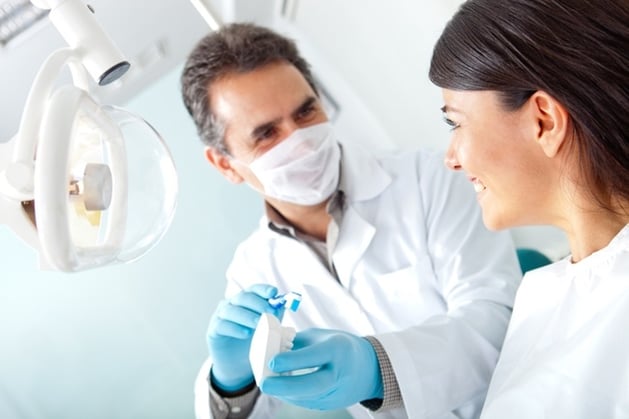
Everyone has heard the advice to brush and floss twice a day, rinse with mouthwash and visit the dentist's office regularly. But, for many, the hectic nature of each day can make it challenging to prioritize oral health and focus on the details that protect our teeth in the long-term. Even the most diligent person who brushes and flosses consistently may be making simple mistakes that harm their teeth in time. To help ensure everyone in your family can keep their teeth strong for years, here are five dental care tips to share with your loved ones:
"Replace your toothbrush every three to four months."
1. See your dentist regularly
Finding the time and money to see your dentist every six months can be tough, especially if you're paying out of pocket. Whereas Medicare doesn't cover routine dental checkups or cleanings, other dental solutions, such as a monthly-paid dental card, can reduce the cost of these services by 20 percent to 50 percent. Finding affordable solutions to seeing your dentist regularly is an imperative aspect of lifelong dental health.
2. Take care of your equipment
If you can't remember the last time you bought a new toothbrush, odds are its time to switch out your current one. The Mayo Clinic advises replacing your toothbrush, or the head of an electric model, every three to four months, or whenever the bristles start to fray. Note that this is likely more often than you'll visit the dentist (recommended every six months), so be sure to keep track of how long you've been using your current toothbrush, rather than relying on the dentist to provide a new one.
3. Eat with your teeth in mind
While sugary foods can encourage tooth decay, foods that are high in calcium and vitamin C help protect your teeth. U.S. News & World Report notes that foods such as yogurt and cheese are good sources of calcium, while citrus fruits (in moderation) offer lots of vitamin C. Focusing on regularly eating foods that strengthen your teeth and avoiding those that are harmful to your enamel and gums is a great oral care strategy to complement regular brushing and flossing.
4. Focus on technique when brushing and flossing
Spending two to three minutes twice a day brushing your teeth can get a bit redundant, but this time is the cornerstone of good oral hygiene. If it feels like you're just going through the motions, make a point of practicing your form and ensuring that you're using good brushing and flossing technique. Make sure that you brush every surface of your mouth, and when flossing focus on one tooth at a time.
5. Rinse after every meal
While mouthwash may not always be readily available after a meal, try to rinse with a drink of water whenever possible when you're done eating. This practice helps wash food remnants and germs out of your mouth and also deters bad breath. This simple habit will help keep your mouth clean throughout the day between brushings.
1 "Oral health: Brush up on dental care basics," The Mayo Clinic, May 14, 2013. http://www.mayoclinic.org/healthy-living/adult-health/in-depth/dental/art-20045536
2 "9 easy dental care tips," by Bonnie Taub-Dix, U.S. News & World Report, Jan. 30, 2014. http://health.usnews.com/health-news/blogs/eat-run/2014/01/30/9-easy-dental-care-tips
